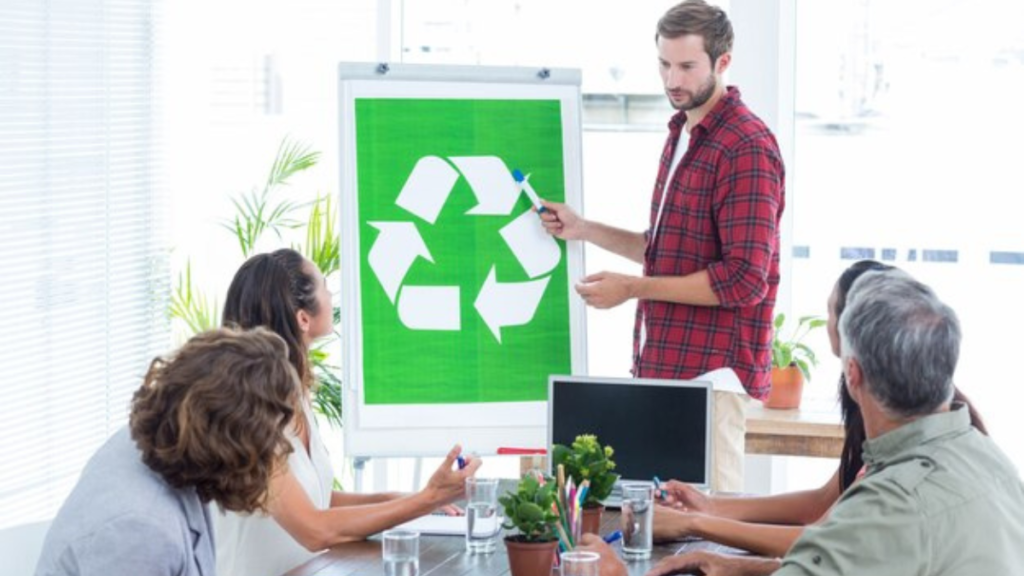Welcome to the world of recycling centers, where waste finds its second chance! In our fast-paced modern society, it’s no secret that we generate mountains of waste every single day. From packaging materials to discarded electronics and beyond, the environmental impact of this excessive waste is undeniable. That’s where recycling centers come into play – these unsung heroes are at the forefront of sustainable waste management, helping to reduce pollution, conserve resources, and create a greener future for all.
In this blog post, we will delve into the role and importance of recycling centers in our quest for sustainability. We’ll explore how these facilities contribute to minimizing the environmental footprint caused by our throwaway culture. Join us as we unravel the fascinating process behind recycling and shine a light on innovative solutions that can enhance the efficiency and effectiveness of recycling centers. So grab your eco-friendly beverage and let’s embark on this enlightening journey together!
The Environmental Impact of Waste and the Need for Recycling
Our planet is facing a growing waste crisis that poses significant environmental challenges. The disposal of waste in landfills not only takes up valuable space but also contributes to pollution and greenhouse gas emissions. As our population continues to grow, so does the amount of waste we generate, making it crucial for us to find sustainable solutions.
One of the most effective ways to address this issue is through recycling. By diverting materials from landfills and reusing them in new products, we can significantly reduce our ecological footprint. Recycling conserves natural resources such as timber, water, and minerals by reducing the need for raw materials extraction.
Moreover, recycling helps mitigate climate change by reducing energy consumption associated with manufacturing processes. Producing goods from recycled materials often requires less energy compared to producing them from virgin resources. This means lower carbon dioxide emissions and a smaller impact on global warming.
Additionally, recycling plays a vital role in preserving ecosystems and protecting wildlife habitats. Improper waste disposal can lead to contamination of soil and water sources, endangering plants, animals,and even humans who rely on these resources for survival.
By promoting recycling practices at individual levels as well as establishing efficient systems at a larger scale like recycling centers or facilities, we can make a significant impact on waste management efforts. These centers serve as collection points where recyclable materials are sorted,categorized,and prepared for processing into new products.
The Process of Recycling: From Collection to Sorting
Recycling is a crucial part of sustainable waste management, and understanding the process from collection to sorting is essential in order to fully grasp its importance. The journey of recyclable materials begins with their collection from various sources such as households, businesses, and public spaces.
Once collected, these materials are transported to recycling centers where they undergo a meticulous sorting process. This involves separating different types of recyclables such as paper, plastic, glass, and metal. Specialized equipment is used to efficiently sort the materials based on their properties and composition.
The sorted items then go through a cleaning process to remove any contaminants or impurities that may hinder the recycling process. For example, plastic bottles may be washed thoroughly before being shredded into tiny pieces for further processing.
After cleaning, the recyclables are transformed into raw materials that can be used in manufacturing new products. Paper can be pulped and turned into new paper products; plastics can be melted down and molded into new plastic items; glass can be crushed and processed for use in creating new glassware; metals can be melted down for reuse in various industries.
This entire process plays a crucial role in diverting waste from landfills and reducing our reliance on virgin resources. By giving discarded items a second life through recycling centers, we conserve energy, reduce pollution levels, save valuable natural resources like water and timber – ultimately contributing towards building a greener world.
So next time you separate your recyclables at home or drop them off at a local center, remember that you’re not only doing your part for the environment but also playing an integral role in ensuring sustainability for future generations. Recycling centers are key players in this effort by facilitating the transformation of waste into valuable resources through their efficient processes – making it possible for us all to contribute towards creating a more sustainable future!
The Role of Recycling Centers in Sustainable Waste Management
Recycling centers play a crucial role in sustainable waste management by providing a centralized location for the collection, sorting, and processing of recyclable materials. These facilities serve as important hubs that help divert waste from landfills and promote the reuse of valuable resources.
One of the primary functions of recycling centers is to collect recyclables from various sources such as households, businesses, and public spaces. By offering convenient drop-off points or curbside pickup services, these centers encourage individuals to responsibly dispose of their recyclable items instead of throwing them away.
Once collected, the materials undergo a meticulous sorting process at recycling centers. This involves separating different types of materials like plastics, paper, glass, and metals into distinct categories. The sorted materials are then prepared for further processing or sent off to manufacturers who can transform them into new products.
By effectively managing the sorting and processing stages of recycling, these centers ensure that valuable reusable resources remain in circulation rather than being wasted in landfills. This not only helps conserve natural resources but also reduces energy consumption and greenhouse gas emissions associated with virgin material extraction and production processes.
Moreover, recycling centers contribute to job creation within local communities. They provide employment opportunities for workers involved in tasks such as collection logistics, sorting operations, maintenance work, administrative roles,and even research on innovative recycling technologies.
Challenges Faced by Recycling Centers
Recycling centers play a crucial role in sustainable waste management, but they are not without their challenges. One of the main obstacles faced by these centers is contamination. It can be difficult to ensure that all materials collected for recycling are free from contaminants such as food residue or non-recyclable items. Contamination can lower the quality and value of recycled materials, making it less economically viable for recycling facilities.
Another challenge is the lack of awareness and participation from the public. Many people still do not fully understand the importance of recycling or how to properly separate recyclables from trash. This leads to mixed waste streams, which require additional sorting efforts at recycling centers.
Limited infrastructure is also a significant challenge for recycling centers. In some areas, there may not be enough collection points or processing facilities to meet the demand for recycling services. This can result in longer transportation routes and increased costs for transporting materials to distant locations.
In addition, fluctuating market conditions pose another hurdle for recycling centers. The prices of recycled materials often depend on global markets and demand-supply dynamics. When commodity prices drop, it becomes financially challenging for these centers to cover their operational costs and maintain profitability.
While recycling centers contribute significantly to sustainable waste management, they face various challenges that need to be addressed collectively by governments, communities, and individuals alike.
Innovative Solutions for Improving Recycling Centers
Recycling centers play a crucial role in sustainable waste management, but they also face challenges in their operations. To overcome these challenges and enhance their efficiency, various innovative solutions have been developed.
One such solution is the implementation of advanced sorting technologies. Traditional recycling centers rely heavily on manual sorting, which can be time-consuming and less accurate. However, with the advent of automated sorting systems using optical sensors and artificial intelligence algorithms, the process has become faster and more precise. This not only increases the overall efficiency of recycling centers but also ensures that recyclable materials are properly sorted and sent for processing.
Another promising innovation is the utilization of smart bins or containers equipped with sensor technology. These bins can monitor fill levels in real-time, allowing recycling center staff to optimize collection routes based on actual demand rather than fixed schedules. This reduces unnecessary trips and fuel consumption while ensuring timely pick-ups when bins are full.
Furthermore, some recycling centers have started implementing public education campaigns to raise awareness about proper waste segregation and encourage participation in recycling programs. By educating communities about the importance of recycling and providing clear guidelines on what can be recycled, these initiatives aim to reduce contamination rates at source – resulting in higher-quality recyclables that are easier to process.
Additionally, partnerships between recycling centers and local businesses or industries have proven beneficial for both parties involved. For instance, some companies generate significant amounts of specific types of waste materials that can be recycled into new products within a closed-loop system. By collaborating with nearby recycling centers, they not only contribute to sustainable waste management but also reduce disposal costs while obtaining valuable raw materials for their production processes.
Moreover, advancements in data analytics allow operators of recycling centers to track key performance indicators (KPIs) such as throughput rates or contamination levels over time. By analyzing this data regularly, they can identify areas where improvements are needed and implement targeted strategies accordingly – leading to continuous optimization of recycling center operations.
Conclusion:
As we look towards the future, it is clear that recycling centers will play a crucial role in sustainable waste management and creating a greener world. These centers are essential for diverting waste from landfills and reducing our reliance on raw materials.
With growing awareness about the environmental impact of waste, more individuals and businesses are recognizing the importance of recycling. This increased demand highlights the need for efficient and well-equipped recycling centers to handle the influx of recyclable materials.







